In this article, we'll be comparing three prominent cloud hosting providers: Vultr, DigitalOcean, and Linode. Our aim is to help you make an informed decision when choosing the best provider for your specific needs, based on criteria such as pricing, features, performance, security, and support.
When evaluating these three providers, it's clear that each has its own unique strengths and advantages. So, let's dive right into our detailed analysis of these three cloud hosting giants.
Vultr Overview
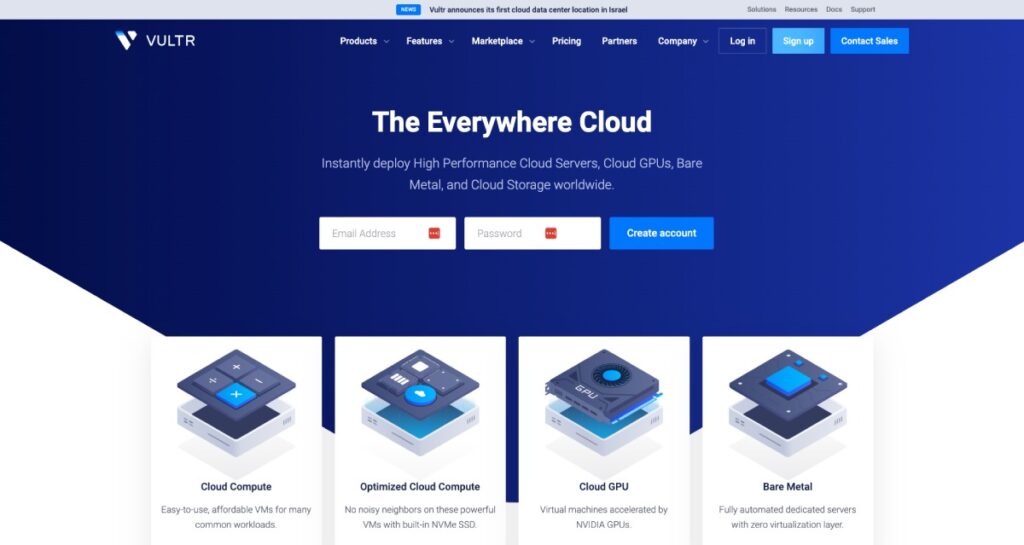
Vultr, founded in 2014, is a cloud hosting provider that offers a wide range of services including cloud compute instances, bare metal dedicated servers, and managed databases. With its 32 global data centers, Vultr aims to simplify infrastructure deployment and management for businesses of all sizes.
Vultr's main offerings include optimized cloud compute instances, bare metal servers, managed databases, cloud GPUs, block storage, load balancers, and object storage. They provide a 100% uptime Service Level Agreement (SLA) and 24/7/365 technical support.
DigitalOcean Overview
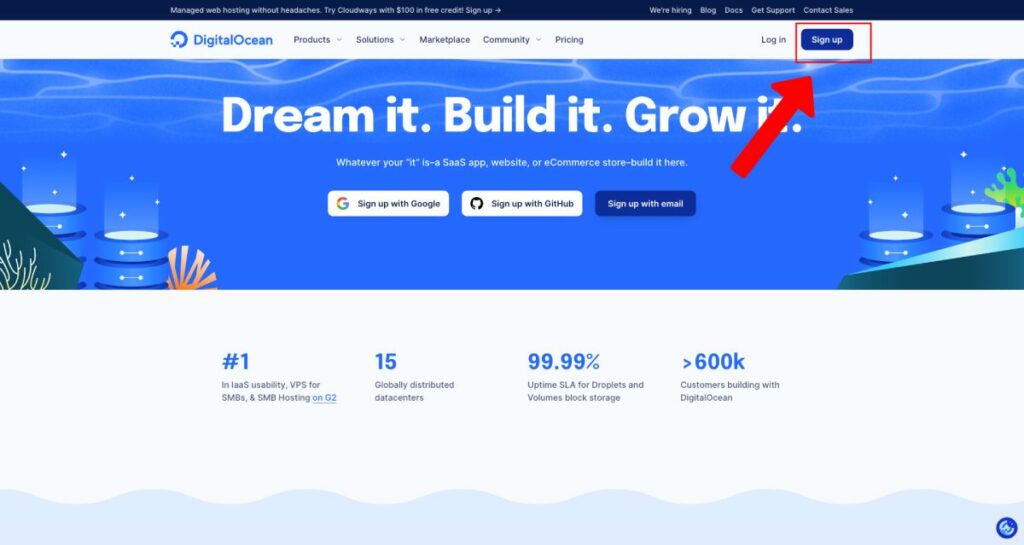
Established in 2011, DigitalOcean is a cloud hosting provider that caters to the needs of small and medium-sized businesses. They offer various products like managed web hosting, scalable virtual machines called Droplets, managed Kubernetes clusters, and an app development platform.
DigitalOcean's suite of products includes Cloudways for managed hosting, Droplets for virtual machines, Kubernetes for a scalable managed solution, App Platform for building and deploying apps, managed databases for MongoDB, MySQL, PostgreSQL, and Redis, and Spaces object storage and Volumes block storage. They also provide educational resources and technical tutorials for customers.
Linode Overview
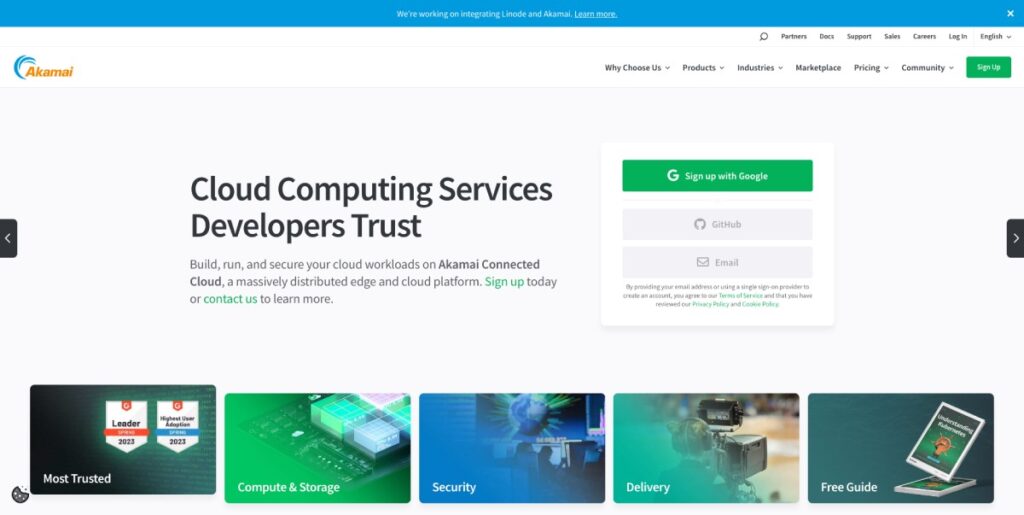
Linode, founded in 2003, is a cloud services provider that offers compute, storage, security, and delivery solutions. They provide tools for various workloads along with storage and management options, focusing on accessibility and customer support.
Linode's services consist of cloud hosting plans with reliable SSD storage, one-click apps, managed services, and developer tools. They offer bundled services such as DDoS protection and cloud firewalls, and a variety of pricing plans with predictable costs. Linode provides 24/7/365 customer support and a commitment to accessibility.
Pricing Comparison
Below we will compare prices between Vultr, DigitalOcean and Linode
Vultr Pricing Structure
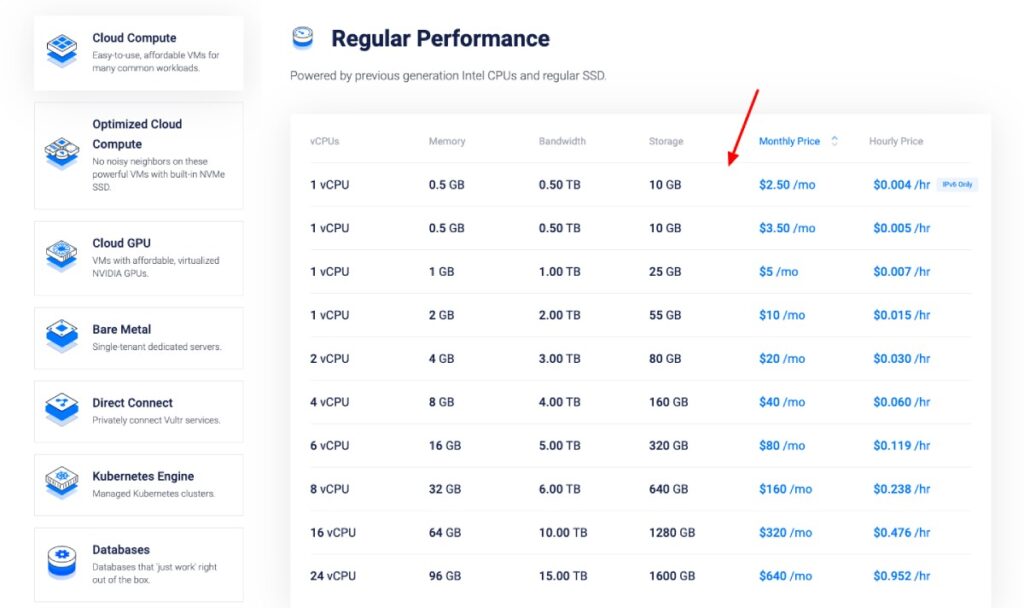
1. Standard Compute Plans: Vultr offers a range of standard compute plans, starting with their basic plan at $2.50 per month, which includes 1 vCPU, 512MB RAM, 10GB SSD storage, and 0.5TB transfer.
Plans scale upwards, with options such as the $10 per month plan, which offers 1 vCPU, 2GB RAM, 55GB SSD storage, and 2TB transfer. For more resource-intensive projects, their highest plan includes 8 vCPUs, 32GB RAM, 640GB SSD storage, and 10TB transfer for $160 per month.
2. Dedicated Cloud Plans: For users requiring dedicated resources, Vultr's dedicated cloud plans start at $60 per month, providing 2 vCPUs, 8GB RAM, 120GB SSD storage, and 3TB transfer. The plans scale up to their most powerful option, offering 32 vCPUs, 384GB RAM, 4000GB SSD storage, and 15TB transfer for a monthly cost of $960.
3. Additional Costs: Vultr also charges for additional services, such as backups (starting at $1 per month), snapshots (at $0.05 per GB), and data transfer overages (at $0.01 per GB).
DigitalOcean Pricing Structure
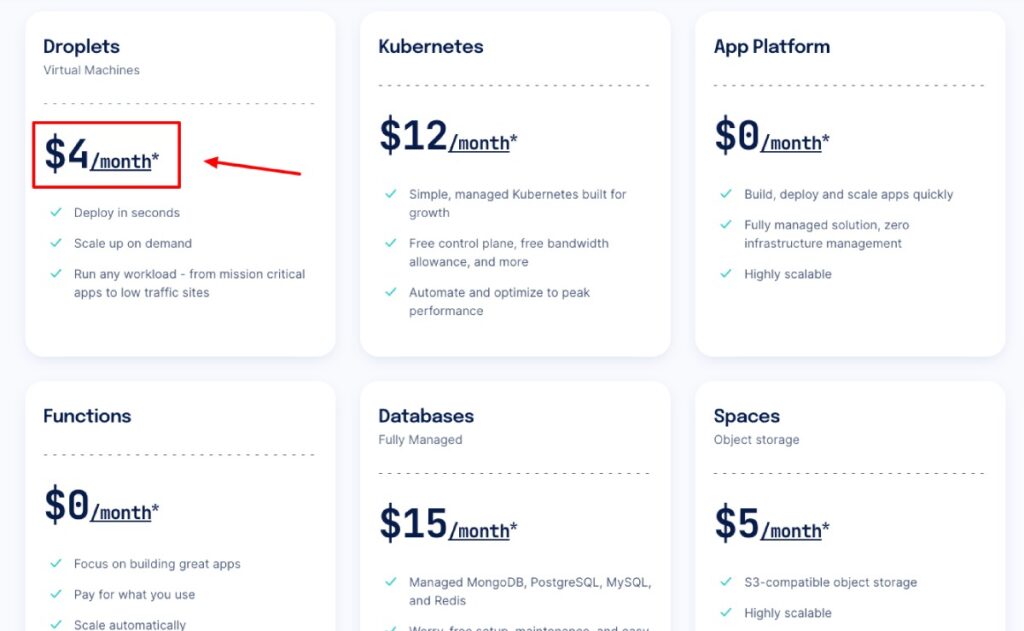
1. Droplet Plans: DigitalOcean's Droplet plans begin at $4 per month, with 1 vCPU, 1GB RAM, 25GB SSD storage, and 1TB transfer. The plans scale upwards, with options like the $20 per month plan that includes 2 vCPUs, 4GB RAM, 80GB SSD storage, and 4TB transfer. Their highest plan offers 32 vCPUs, 192GB RAM, 3840GB SSD storage, and 12TB transfer at a cost of $960 per month.
2. Managed Kubernetes and Databases: DigitalOcean also offers managed Kubernetes and databases, with pricing starting at $12 per month for the basic plan, which includes 1 vCPU, 2GB RAM, and 25GB SSD storage. For more resource-intensive needs, the highest plan costs $2,240 per month, providing 32 vCPUs, 192GB RAM, and 3840GB SSD storage.
3. Additional Costs: Additional costs with DigitalOcean include backups (starting at $1 per month), snapshots (at $0.05 per GB), and data transfer overages (at $0.01 per GB).
Linode Pricing Structure
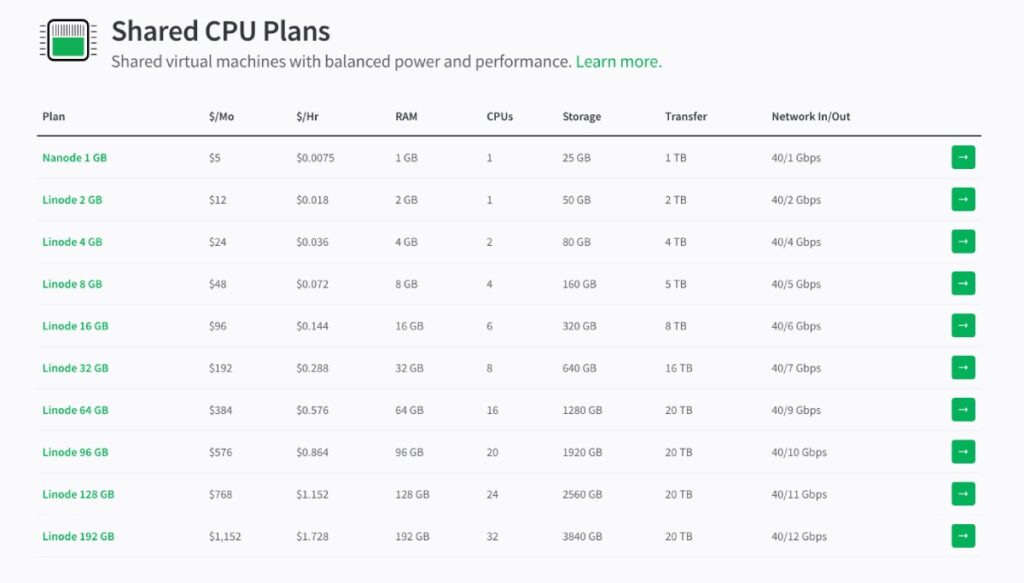
1. Standard Compute Plans: Linode's standard compute plans start at $5 per month for 1 vCPU, 1GB RAM, 25GB SSD storage, and 1TB transfer. Scaling up, their $20 per month plan offers 2 vCPUs, 4GB RAM, 80GB SSD storage, and 4TB transfer. The most powerful standard plan includes 20 vCPUs, 96GB RAM, 1920GB SSD storage, and 20TB transfer for $320 per month.
2. Dedicated CPU Plans: For dedicated resources, Linode offers plans starting at $30 per month, which include 2 vCPUs, 4GB RAM, 80GB SSD storage, and 4TB transfer. The highest dedicated CPU plan provides 32 vCPUs, 192GB RAM, 3840GB SSD storage, and 20TB transfer for a monthly cost of $960.
3. Additional Costs: Linode also charges for backups (starting at $2 per month), snapshots (at $0.10 per GB), and data transfer overages (at $0.01 per GB).
Winner: Vultr
Upon comparing the pricing structures of Vultr, DigitalOcean, and Linode, it's clear that each provider offers competitive pricing and a range of plans to suit different needs.
However, if we consider the overall value for money, Vultr takes the lead with its lower entry-level pricing for standard compute plans and dedicated cloud plans. Additionally, Vultr's pricing for additional services like backups and snapshots is on par with DigitalOcean and slightly cheaper than Linode.
Therefore, Vultr emerges as the winner in terms of pricing.
Performance Comparison
In the world of cloud hosting, performance is a critical factor in choosing the best provider for your business. In this section, we'll discuss the performance of Vultr, DigitalOcean, and Linode, focusing on server locations and data centers, speed and server performance benchmarks.
Server Locations and Data Centers
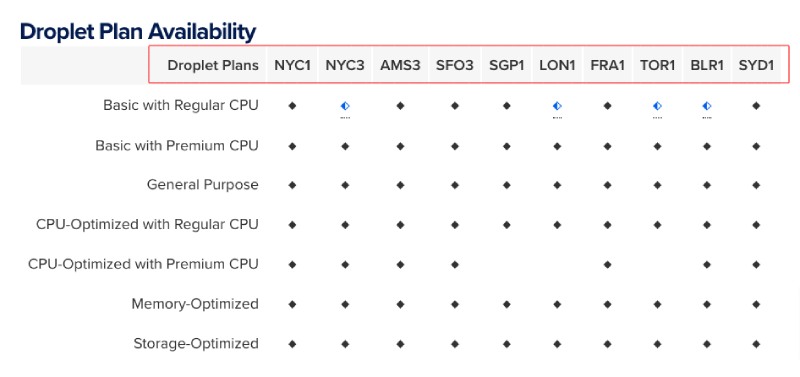
1. Vultr boasts a global presence with 19 server locations across the globe, including North America, Europe, Asia, and Australia. This extensive network allows them to provide low-latency services to their users.
2. DigitalOcean has a slightly smaller network, with 13 data centers in 8 countries. However, their data centers are strategically placed in key regions, ensuring optimal performance for their customers.
3. Linode currently has 11 data centers across three continents, offering a decent coverage for businesses worldwide.
Speed and Server Performance Benchmarks

To determine the best provider in terms of performance, we have to consider four key aspects: CPU performance, RAM performance, Disk I/O performance, and Network performance.
1. CPU Performance: DigitalOcean edges out both Vultr and Linode in terms of CPU performance, offering the best single-core performance, as seen in VPSBenchmarks tests.
2. RAM Performance: In terms of RAM performance, Linode takes the lead with the fastest read and write speeds, as shown in tests.
3. Disk I/O Performance: Vultr and DigitalOcean both excel in Disk I/O performance, offering faster read and write speeds than Linode.
4. Network Performance: DigitalOcean outperforms both Vultr and Linode in terms of network performance, providing faster upload and download speeds.
Winner: DigitalOcean
Based on the performance benchmarks, it's clear that DigitalOcean stands out as the winner in terms of overall performance. Their superior CPU and network performance, along with competitive Disk I/O performance, make them the top choice.
However, it's worth noting that Vultr and Linode both have their strengths, with Vultr excelling in Disk I/O performance and Linode boasting the best RAM performance. Ultimately, the choice between these three providers will depend on the specific performance requirements of your business.
Scalability Comparison
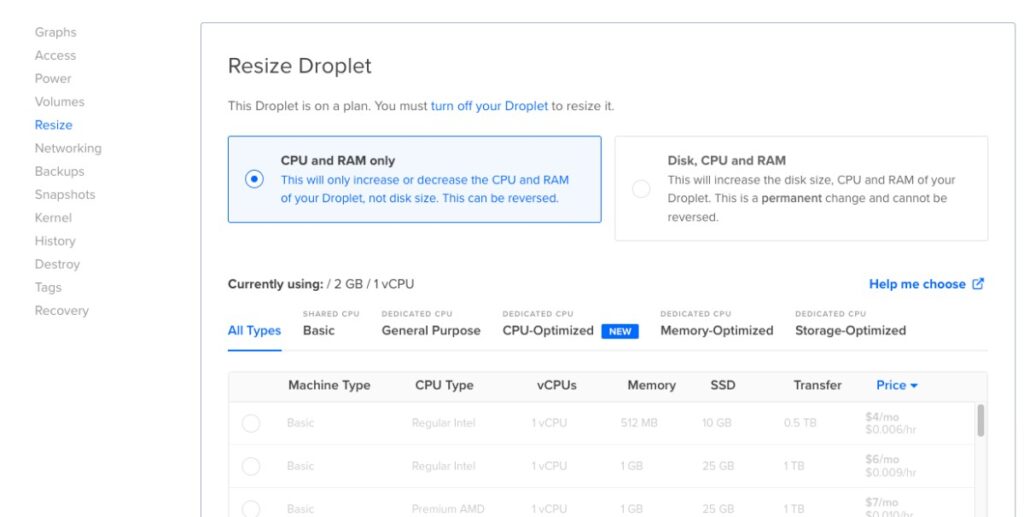
Scalability is an essential factor to consider when choosing a cloud hosting provider. In this section, we'll review the scalability options offered by Vultr, DigitalOcean, and Linode, discussing their respective strengths and limitations.
1. Vultr
Vultr offers a range of scalable cloud hosting solutions, including Cloud Compute instances and High Frequency Compute instances. Users can easily upgrade or downgrade their server resources according to their requirements.
However, Vultr does not support live vertical scaling, which means customers will experience downtime during the scaling process. Additionally, customers can deploy load balancers to distribute traffic across multiple instances, ensuring high availability and performance.
2. DigitalOcean
DigitalOcean provides Droplets that can be resized on-the-fly, ensuring minimal downtime during the scaling process. DigitalOcean also offers Managed Kubernetes, which allows seamless horizontal scaling of containerized applications.
Additionally, DigitalOcean Load Balancers can be utilized to distribute traffic evenly across multiple Droplets, ensuring high availability and optimal performance.
3. Linode
Linode offers easy vertical scaling with its Cloud VPS plans, allowing users to scale their server resources according to their needs. However, like Vultr, Linode does not support live vertical scaling, resulting in downtime during the scaling process. Linode also provides NodeBalancers, which help distribute traffic across multiple instances, ensuring high availability and reliable performance.
Winner: DigitalOcean
When comparing the scalability options of Vultr, DigitalOcean, and Linode, it's evident that DigitalOcean takes the lead. DigitalOcean's on-the-fly Droplet resizing and Managed Kubernetes services offer seamless scaling with minimal downtime, while Vultr and Linode lack live vertical scaling capabilities.
Furthermore, all three providers offer load balancing and high availability solutions, but DigitalOcean's Load Balancers edge out the competition with their advanced features and ease of use.
Ease of Use and User Interface Comparison
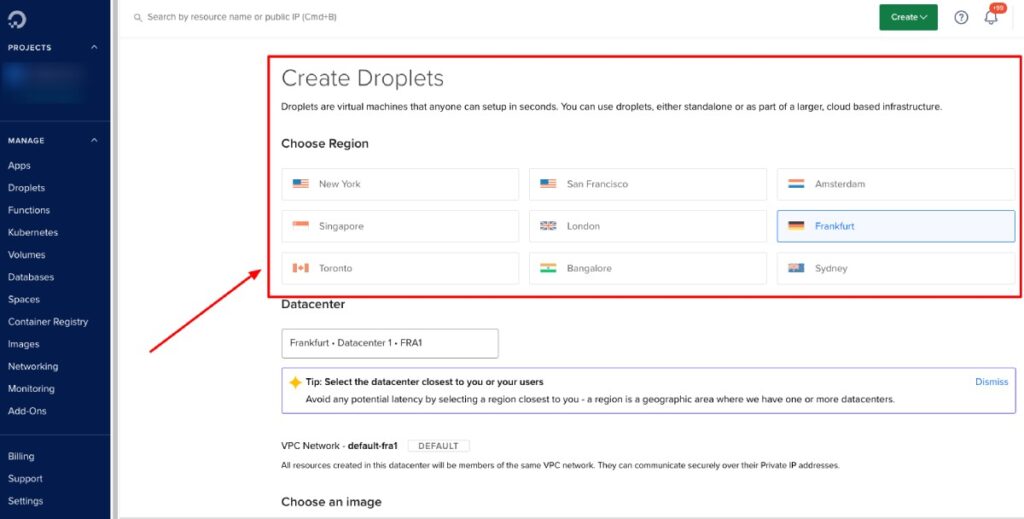
Control panel and user interface
1. Vultr: Vultr boasts a clean and intuitive control panel that allows users to manage their cloud hosting effortlessly. The platform features one-click app installations, making it easy for users to deploy applications in a matter of minutes. Additionally, Vultr offers a wide range of operating systems and customizable templates, giving users more flexibility and control over their hosting environment.
2. DigitalOcean: DigitalOcean is known for its user-friendly control panel and easy-to-navigate interface. The platform features a well-organized dashboard that displays essential information at a glance, such as resource usage and billing details. Users can also access numerous tutorials and documentation, making it easier for them to get started and manage their hosting efficiently.
3. Linode: Linode offers a straightforward control panel that simplifies the management of cloud hosting services. Users can easily monitor their resources, deploy applications, and access support through the interface. While not as visually appealing as its competitors, Linode's control panel is functional and offers all the necessary tools for effective cloud hosting management.
API and developer tools
All three platforms provide robust APIs, allowing developers to automate tasks and integrate their applications seamlessly. DigitalOcean offers an extensive API documentation and various SDKs, while Vultr and Linode also provide comprehensive API guides, ensuring developers can make the most of their hosting services.
Third-party integrations
Both DigitalOcean and Vultr offer a range of third-party integrations, such as monitoring tools, backup services, and content delivery networks. Linode, on the other hand, offers fewer integrations compared to its competitors but still provides essential tools like monitoring and backup services.
Winner: DigitalOcean
Based on my experience and expertise in the field, I can confidently assert that DigitalOcean offers the best overall user interface and ease of use among these three platforms. The platform's clean design, extensive documentation, and user-friendly control panel make it the top choice for both beginners and experienced users alike.
Customer Support Comparison
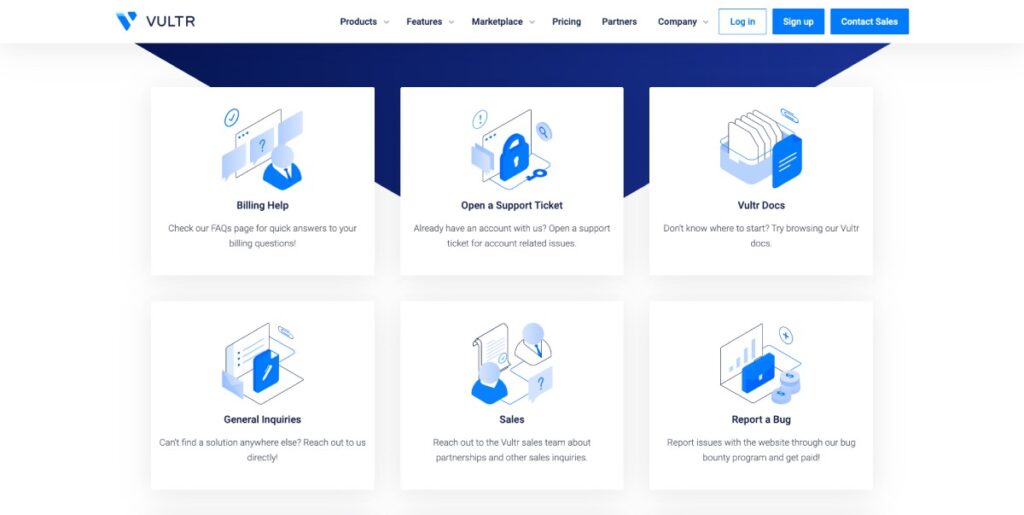
- Vultr: Vultr offers a comprehensive knowledge base, community forum, and ticket-based support system for their customers.
- DigitalOcean: DigitalOcean provides a vast knowledge base, community forum, ticket support, and developer-focused blog for assistance. They also offer premium support plans with faster response times and live chat for an additional fee.
- Linode: Linode's support channels include a detailed knowledge base, community forum, and ticket-based support. They also provide phone support for critical issues.
While all three providers offer ticket-based support, their response times and quality tend to vary. Vultr's support provides more in-depth help but may have longer wait times. DigitalOcean's free support has relatively quicker response times, but their premium support plans offer even faster assistance. Linode's support is known for its quick response times and helpful assistance.
Winner: DigitalOcean
In terms of customer support, all three providers offer a good range of resources, including knowledge bases, community forums, and ticket-based support. DigitalOcean stands out with its premium support plans, which provide faster response times and live chat assistance. However, Linode's phone support for critical issues is a valuable addition.
Based on my experience, I would recommend DigitalOcean for users who prioritize faster response times and are willing to invest in a premium support plan.
Conclusion
In conclusion, when choosing between Vultr, DigitalOcean, and Linode, it is essential to consider your business requirements and the specific additional features and services that each provider offers. Carefully evaluating these factors will enable you to make an informed decision and select the best cloud hosting provider for your needs.
Having examined the key features, performance, security, and support of Vultr, DigitalOcean, and Linode, it's clear that each provider has its own unique offerings.
When it comes to recommendations for different use cases, here are our final suggestions:
- Startups: DigitalOcean, with its focus on simplicity, ease of use, and comprehensive product suite, is an ideal choice for startups looking to grow their online presence.
- Small Businesses: Vultr offers a reliable and flexible cloud hosting platform, with a wide range of server locations and a powerful control panel for businesses of all sizes.
- Enterprises: Linode, with its advanced DDoS protection and competitive pricing, could be a suitable option for enterprises that prioritize security and cost-effectiveness.
It is essential to consider factors such as performance, security, support, and scalability while making your decision. By taking a careful look at the features and benefits of each provider, you can make an informed choice that best suits your business needs.
Ludjon, who co-founded Codeless, possesses a deep passion for technology and the web. With over a decade of experience in constructing websites and developing widely-used WordPress themes, Ludjon has established himself as an accomplished expert in the field.





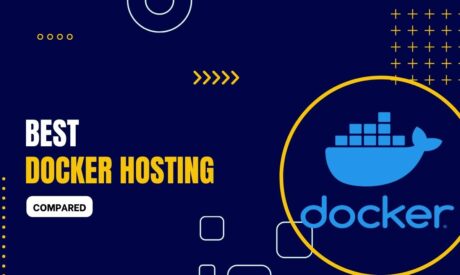


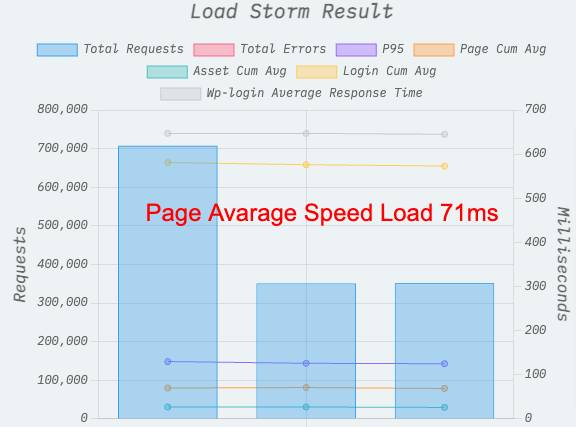
Comments